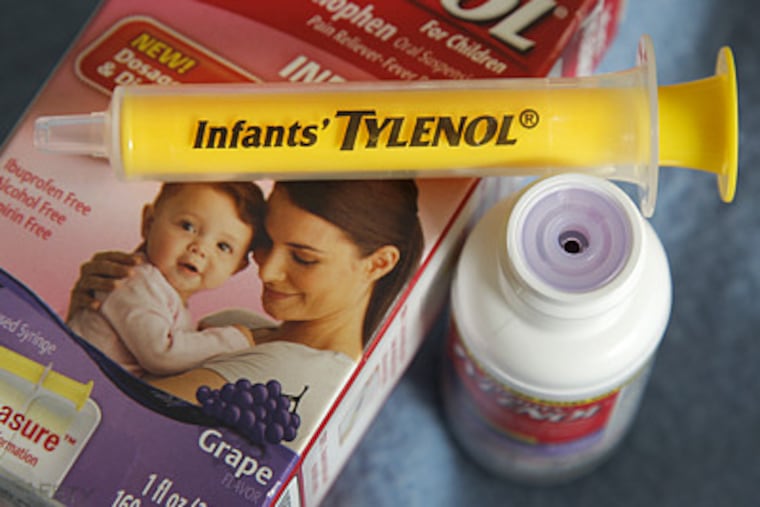
Johnson & Johnson said Friday it is recalling more Tylenol.
This time, the company is pulling back about 574,000 bottles of grape-flavored Infants Tylenol because a new dispenser malfunctioned when used by some parents, who had hoped the redesigned system with a syringe and flow restrictor would prevent overdosing.
The recall is the latest setback for the McNeil Consumer Healthcare Division, which is based in Fort Washington.
The manufacturing part of that facility was shut down in April 2010 because of several problems, including musty smells and metal particles in medicines, that led to dozens of recalls. J&J officials say they have spent $100 million to fix the problems, but will need approval from a federal court judge and the U.S. Food and Drug Administration to resume production. The McNeil plants in Lancaster and Puerto Rico continue to operate, but under closer FDA scrutiny.
A few products had returned to shelves, but J&J had lost about $1 billion in sales because of the recalls and shutdown.
"Today's news about the Infants Tylenol recall is clearly disappointing after all the progress that McNeil has been making to ensure its products meet the highest level of quality and consumer satisfaction," J&J chairman and chief executive officer Bill Weldon said in a statement. "It's also an important reminder that we must take every step to preserve and reinforce our commitment to patients and customers, and that is why we are taking the voluntary actions we did today."
In trying to get Tylenol, Motrin and other nonprescription medicines back to the market, J&J has shifted production to facilities all over the world. The syringe-flow restrictor system and the lots of medicine in the recall were made in Latina, Italy.
In trying to avoid spillage and dosing concerns, engineers designed a plastic syringe, without a needle, to be inserted into a cap atop the bottle, with a flow restrictor to measure the dosage. Theoretically, after turning the bottle upside down, the proper amount of medicine would be withdrawn into the syringe and squirted into the child's mouth.
Infants Tylenol was for children two years of age and under. Children's Tylenol, for those age 2 to 11, is still available.
However, a few parents pushed the flow restrictor into the bottle when they tried to use the syringe. J&J says the medicine is not unsafe and it reports no adverse effects. It says that if the flow restrictor remains in place, the product may be used. But if the flow restrictor is pushed into the bottle, parents or caregivers should not use the product.
"The company is looking at various alternatives for redesigning the system and then setting a timeline for bringing products back to market," McNeil spokeswoman Bonnie Jacobs said. "The system was tested before it went on the market, but with some consumer products, problems only become apparent when they are used by many customers in real-life situations."